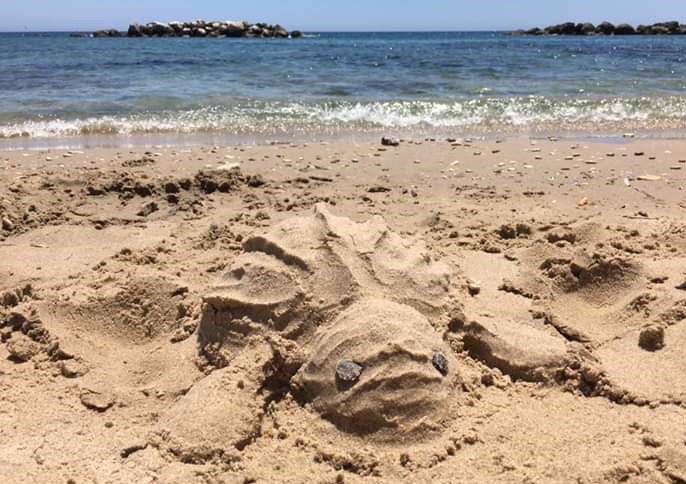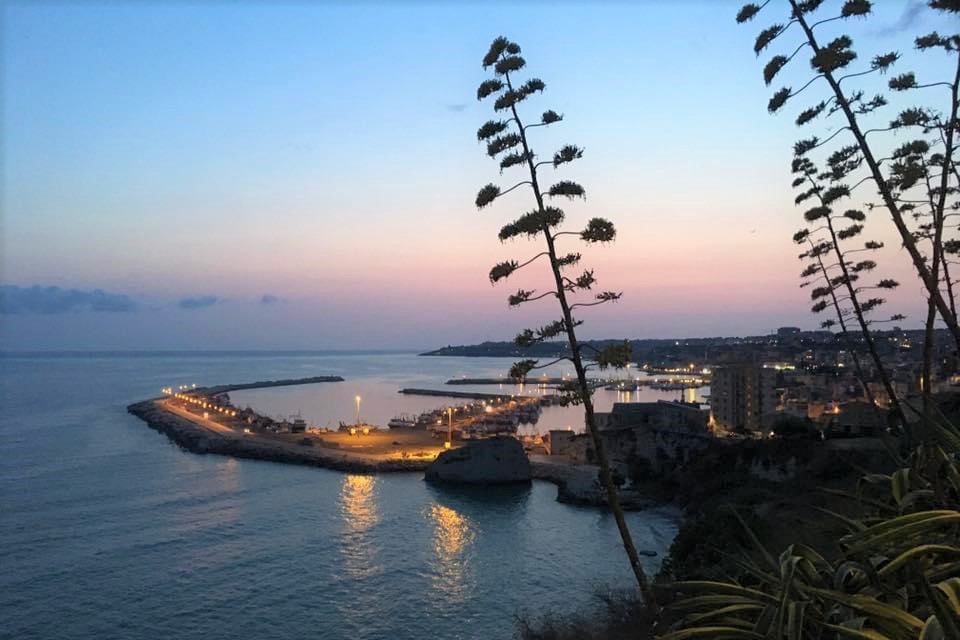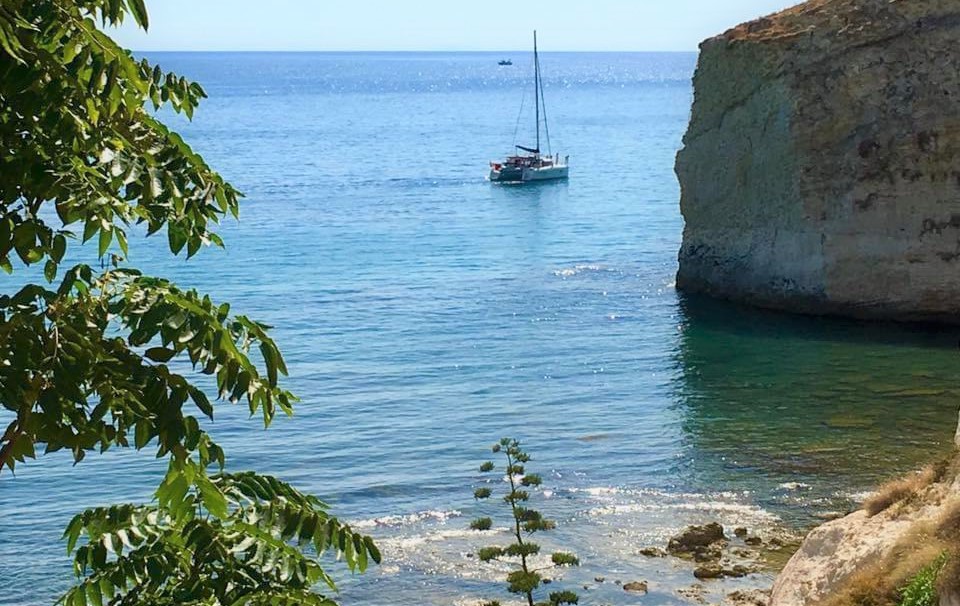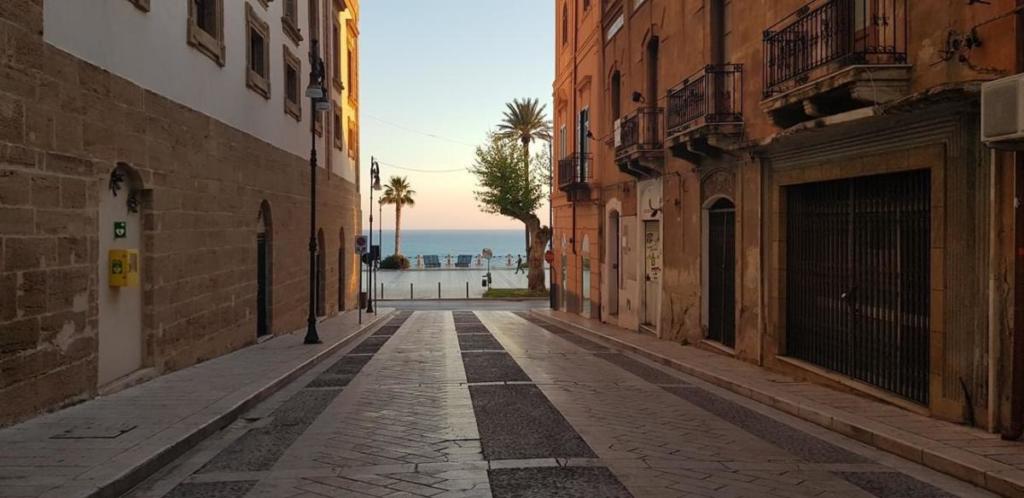There is a place in this city, in my city, where a single glimpse, a single crumb of the whole landscape reminds you why Sciacca knows you are at home.
Because you can forget all those flaws that make Sciacca an imperfect town.
As soon as I turn the corner, leaving behind me the strong smell of the panelle (chickpea fritters) and the meusa (veal spleen strips), the chaos of the municipal houses and the arrivals and departures of the buses, the Mediterranean is presented to me, which gently gives its salty waters to the unrecognizable coasts of the city.
Going on my way. Before I completely look out from the long terrace overlooking the sea, I am obliged to walk on a grey brick sidewalk that flanks a stone wall just a little more than a child's height in his first years of life.
On this wall is my personal refuge and that of many other loving couples.
A grass of a few centimetres height, often uncultivated, hides some lilac flowers and a few white butterflies among its green tufts.
A bench looks over a wooden handrail, towards the harbour full of moored boats, or those approaching on the return to the dock, while white seagulls fly and dive attracted by the smell of freshly caught fish.
I am here, enchanted, on the grey sidewalk and a cat with thick black fur darting past me, regardless of myself and the cars, crouching under the shadow of a mighty tree.
A tree with an inclined trunk and foliage so large as to force all the branches to bend towards the ground, reserving for the black kitten a cool space away from the summer heat typical of this part of Sicily, closest to Africa.
A motorbike passing by distracts me from my enchantment, I return to myself and thus resume my journey. A slight breeze flows through my hair and comforts me just enough from the heat.
Turning my gaze to the left it is inevitable not to notice the "tumour" of the city.
Bursting, majestic, almost Pharaonic, the fruit of one of the greatest architects of the twentieth century is the Samonà Theatre.
An opportunity for Sciacca to become more charming, a true "lady of high class and culture", yet she is there with bars on the windows and the walled doors, a huge cylinder of grey concrete never completed.
There are those who propose to knock it down as was done with the ancient "Mariano Rossi" theatre.
But in doing so all the mice and seagulls that land there, where would theyfind refuge?
I think this, and one of the seagulls who rested among the peaks of the theatre makes a strong upward momentum, the large white wings stretched out to meet the wind and the muzzle stretched forward force me to follow the flight that cuts the clear air.
A few steps ahead where the railing becomes iron between blue and rust brown, I can finally immerse myself in the view of the turquoise sea.
Each wave shattering against the rocky coast gives me the scent of salt and the summer I have waited for all the endless winter months.
A small stone rolls faster and faster, perhaps driven by the abrupt movement of some animal and begins to slide down the cliff that precedes the coast. Cammuddino if we want to call it by its real name.
On tiptoe leaning against the railing and with my head bent down I see the pebble still in motion, it passes through the spontaneous vegetation typical of the Mediterranean and stops at a trap door where I loved to fantasize as a child taking inspiration from the short stories of my mother.
It was a viewing hatch for soldiers who, hidden in there, saw enemy ships in the distance.
Then my imagination suggested to me the images of young soldiers who quickly entered the trap door passing through a narrow dark tunnel, almost claustrophobic which then led to a large and unique room with a large glass panel all across the front wall.
But I had grown up without ever finding out what really was inside that stone cap, and I still love to fantasize about it.
I leave for a moment the sea, the small Mediterranean scrub and the sky on my right, to investigate the view from the opposite side, among the remains of an ancient and now fallen glory, of a magnificent past but now tinged with an almost pitiful bitterness.
The spa complex was, until a few years ago, the vital centre of my town. A great coming and going of people both tourists and residents of Sciacca occupied the same streets that I am now travelling down in the most absolute desolation.
The spa treatment rooms and the large bar next door were always open. And the smell of sulphurous water was also almost constant, mixed with that of freshly baked hot croissants.
How much I loved that smell.
Then everything had another colour. The light pink of the building and the bright green of the trees around it are now dull colours. The fallen plaster sheds its pretty colour and displays the grey and bare walls, the few remaining trees, on the other side, lose their leaves and die.
Not even the sun, which in the meantime paints the landscape with new colours, manages to revive the atmosphere of abandonment.
It is now eight o'clock and the sun turns the sky a very light orange that is enriched with a thousand shades near the horizon. At the foot of the war memorial, two boys who in the setting of the sun exchange a sweet and sad hug. Their faces fixed in the void looking in opposite directions.
The last ray of light falls on the earth dazzling everything, while the horizon and the sea are stained with orange and then red.
The sun dies and with its blood stains the sea which obstinately tries to imitate the beauty of the sky, which shades from blue to pink, orange and then magenta-purple, amaranth.
It was the last hour of the day. That's their last goodbye.







Follow us